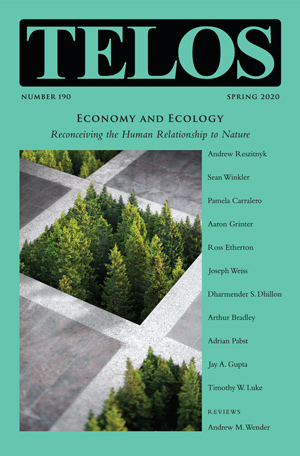Andrew Reszitnyk’s “The Descent into Disanthropy: Critical Theory and the Anthropocene” appears in Telos 190 (Spring 2020): Economy and Ecology: Reconceiving the Human Relationship to Nature. Read the full article at the Telos Online website, or purchase a print copy of the issue in our online store. Individual subscriptions to Telos are available in both print and online formats. Ernst Jünger’s Sturm, published in English translation by Telos Press, is also available in our store.
 This essay suggests that the widespread engagement in humanities scholarship with the concept of the Anthropocene—the proposed geologic epoch in which humans figure as a terrestrial force and the planet appears as a human artifact—has given rise to a strain of critical theory that renounces the imperative to engage in politics. I argue that the notion of the Anthropocene has inspired a turn toward what Greg Garrard calls “disanthropy,” the tendency to fantasize about a world in which living human bodies are absent and to render human life into an abstract concept. Through an analysis of the work of Dipesh Chakrabarty and Timothy Morton, I contend that, insofar as they have become disanthropic, many contemporary critical theorists have relinquished the capacity to engage critically with the influential and pernicious politico-economic ideology of neoliberalism. Although many scholars argue that we should view the Anthropocene as a vital provocation that opens up new corridors for environmentalist scholarship, I propose that we remain skeptical about the value of positing the Anthropocene at the center of critical inquiry. I suggest that the growing reputation of the idea of the Anthropocene has caused a significant segment of humanistic scholarship to enter into a political and philosophical détente with neoliberalism, with the effect that critical theory is becoming less and less capable of responding to the questions posed by the world outside the university.
This essay suggests that the widespread engagement in humanities scholarship with the concept of the Anthropocene—the proposed geologic epoch in which humans figure as a terrestrial force and the planet appears as a human artifact—has given rise to a strain of critical theory that renounces the imperative to engage in politics. I argue that the notion of the Anthropocene has inspired a turn toward what Greg Garrard calls “disanthropy,” the tendency to fantasize about a world in which living human bodies are absent and to render human life into an abstract concept. Through an analysis of the work of Dipesh Chakrabarty and Timothy Morton, I contend that, insofar as they have become disanthropic, many contemporary critical theorists have relinquished the capacity to engage critically with the influential and pernicious politico-economic ideology of neoliberalism. Although many scholars argue that we should view the Anthropocene as a vital provocation that opens up new corridors for environmentalist scholarship, I propose that we remain skeptical about the value of positing the Anthropocene at the center of critical inquiry. I suggest that the growing reputation of the idea of the Anthropocene has caused a significant segment of humanistic scholarship to enter into a political and philosophical détente with neoliberalism, with the effect that critical theory is becoming less and less capable of responding to the questions posed by the world outside the university.


